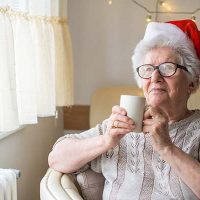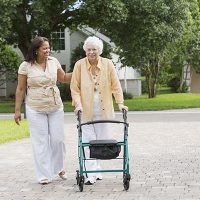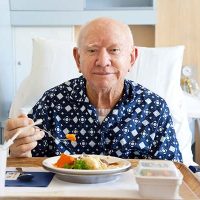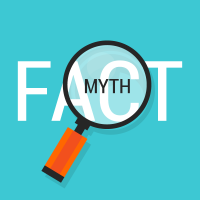December 21, 2018 by Dean Bellefeuille

Even though the yuletide season is usually thought of as a time that is joyous, filled with visiting with those who are nearest and dearest and picking out the perfect gifts, for older adults, it can be anything but merry and bright. A combination of lost loved ones, memories of holidays from the past, health struggles and more can impact seniors with feelings of lonesomeness and sadness. (more…)
December 11, 2018 by Dean Bellefeuille

The holiday season is laden with parties, celebrations, and get-togethers. However, for an aging loved one, holiday activities require a little additional planning and preparation. Follow these holiday tips for Syracuse seniors from At Home Independent Living to be able to ensure fun and relaxed outings with family members of all ages this holiday season. (more…)
November 19, 2018 by Dean Bellefeuille

The team at At Home Independent Living is proud to announce that we have been named one of Syracuse’s top businesses in The Syracuse New Times’ Syracuse’s Finest 2018 Profile Series. This weekly series has been published in The Syracuse New Times since 1994, and profiles local businesses that are committed to excellence. At Home Independent Living in independent living home health care is honored to be featured and to serve our Syracuse community with compassionate, professional in-home care.
SaveSave
SaveSave
November 15, 2018 by Dean Bellefeuille

Ah, the holidays: they’re either the most wonderful time of the year, or the most difficult. For many older adults who have lost loved ones, are battling chronic health conditions, or are experiencing isolation and loneliness, the holidays can trigger depression. And, the family caregivers who care for a senior loved one are also susceptible to holiday blues, due to the overabundance of stress. (more…)
November 12, 2018 by Dean Bellefeuille

Falls among the elderly are all too common and can have dire consequences. Taking preventative measures is key, such as assessing the home for fall risks like throw rugs and other tripping hazards, insufficient lighting, and a lack of appropriate grab bars and railings. But there’s another tactic being recommended now: creating a fall plan of care, which, when implemented properly, is being shown to reduce fall-related hospital visits by as much as 40%. (more…)
November 6, 2018 by Dean Bellefeuille

While we may envision a Norman Rockwell-worthy Thanksgiving celebration, with the whole family enjoying quality time together and Grandma’s traditional feast, the reality for many families includes something unexpected: a trip to the hospital. In fact, statistics show that E/R visits for the elderly jump an astounding 10% – 20% during the holidays. (more…)
October 24, 2018 by Dean Bellefeuille

Oftentimes, families make the assumption that so long as their senior loved one is covered by Medicare, covering the cost for care at home is not an issue they need to give consideration to. Regrettably, however, this is a prevalent misconception. As we shared in a previous blog post, most people use private funds to cover the cost for care at home. There are several possibilities to investigate though for veterans and their spouses. As the top experts in home care in Syracuse NY, At Home Independent Living outlines the facts to help those who have served in the military to acquire all of the resources available to them to cover the cost for care at home.
First to consider is the Veterans’ Aid and Attendance program, which aids wartime veterans and/or their spouses in paying for care at home, as long as they meet the distinct qualifications required to receive these benefits. The person applying must:
- Have received an honorable or general discharge
- Have physician’s orders stating he or she is in need of the aid and assistance of others daily
- Meet specific financial criteria
- Have served one day during an active war and had no less than 90 days of service
- Be the surviving spouse of a veteran to obtain spousal benefits
Certain veterans may also qualify for Housebound to cover the cost for their home care services. Housebound is a benefit that is paid in addition to a monthly pension. Veterans who qualify for Housebound benefits:
- Have a single permanent disability that has been assessed as 100 percent disabling AND, due to such disability, the veteran is permanently and substantially confined to his or her home, OR,
- He or she has one single permanent disability assessed as 100 percent disabling AND, yet another disability, or disabilities, assessed as 60 percent or more disabling.
Legal guidelines state that veterans cannot receive both Aid and Attendance and Housebound benefits together, and they must be receiving a monthly pension in order to meet the requirements for either one of these additional benefits.
If you’d like to find out if your senior loved one may qualify for Veterans’ Aid and Attendance or Housebound benefits, the professionals in home care in Syracuse NY at At Home Independent Living are always available to work with you to look into all your options for funding the in-home senior care your loved one needs. You can reach us at (315) 579-HOME (4663) or contact us online to learn more about our services and the help available to veterans for paying for care at home.
October 9, 2018 by Dean Bellefeuille

It’s safe to assume that at some point your aging parents will have the need for a little extra support in order to continue to be safe and independent, and if they’re similar to the significant majority of older adults, they prefer to age in place at home. The first concern that normally arises is how to pay for in home care services. The Syracuse elderly home care team at At Home Independent Living hears this question often, and we have the answers you need. (more…)
September 18, 2018 by Dean Bellefeuille

We are excited to announce that At Home Independent Living was honored as an award-winning Syracuse in-home care company in the 27th annual National Mature Media Awards Program. The program, presented by the Mature Market Resource Center, a national clearinghouse for the senior market, recognizes the nation’s best marketing, communications, educational materials, and programs designed and produced for older adults.
Our web-based and mobile resources received a Merit Award in the website category. And we would like to extend our thanks to the corecubed team for their hard work designing and writing text for our new site.
“We were delighted to take part in the Mature Media Awards Program this year, and were honored to be selected as a winner,” says Dean Bellefeuille, President of At Home Independent Living.
The entries were judged by a distinguished panel of mature market experts from across the United States for overall excellence of design, content, creativity and relevance to the senior market. The At Home Independent Living home health care team is pleased to be recognized for our website’s caregiving tools for the community as well as the best home care services in Syracuse! Check out our home care service and employer of choice awards, and contact us to learn more about how our award-winning Syracuse in-home care company can help improve quality of life for a senior you love!
August 23, 2018 by Dean Bellefeuille

Urinary incontinence can be an embarrassing issue for those who are impacted by it. The preconception behind the disorder frequently leads to patients having either a lack of facts or trusting in some common misbeliefs about incontinence. The Bridgeport home health experts from At Home Independent Living provide some commonly held incontinence myths and the truth behind each: (more…)










